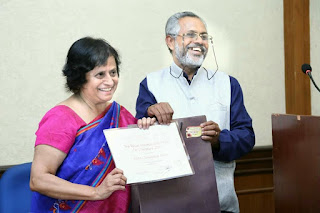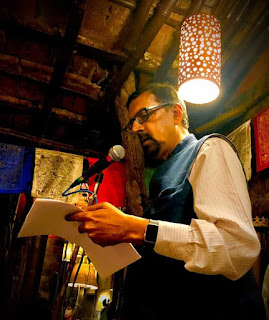Review of Beckett's English Poetry : Transcending the Roots of Resistance in Language , AV Koshy
Review
Beckett’s
English Poetry: Transcending the roots of resistance in language: AV Koshy
Publisher : Authors Press
Price: 550 INR
PP 156
Publisher : Authors Press
Price: 550 INR
PP 156
I recently happened to read an excerpt from the ebook Parisian Lives [2019] by Deidre Bair , Beckett's biographer , where she admits how difficult it was to get Beckett talking about himself, while writing his biography. [Samuel Beckett: A Biography London, Jonathan Cape 1978].
“So you are the one who is going to reveal me for the charlatan that I am.” were the first words that he spoke to her on that cold day on November 17th, 1971 in the lobby of Hotel du Danube on the rue Jacob, where she had gone on his invitation regarding the writing of his biography.
Beckett [1906 – 1989], though Irish, resided in Paris for most of his adult life, and wrote both in English and French, is known more for his plays and novels, rather than his poetry. In fact , let me confess , I was always well conversant with his plays , especially Waiting for Godot , and remember writing the answer to the question forever asked in exams , 'Is 'Waiting for Godot' more nihilistic or existentialist , give reasons in support of your answer .' But recalled having read only one poem of his , 'Whoroscope' , the allusions therein, I had honestly found mind- boggling at that time.
Whether Beckett calls himself a ‘charlatan’, or whether others are dismissive of his poetry, the fact, in the words of John Calder is, that he has “written enough verse to be seen as an important poet in his own right.”
In this intellectually stimulating , hugely enriching ,immensely enticing book , the author , Dr. Ampat Koshy , who needs no introduction as an internationally acclaimed academic -poet- critic- novelist - anthologist , unlayers the many nuances in Beckett's Poetry , stoking the inquisitiveness of the reader further with every chapter .
In the Introduction, Koshy outlines the backdrop of Beckett's poems, dividing the poems into two
periods 1929 to 1935, [The year of learning], during which he wrote what he
called the ‘jettisoned poems’. Here he analyses the first twelve of his
available poems in English, which Beckett confides, he found immature [except
Whoroscope].
Although imitative in his earlier phase, and as David Hayman says, also guilty of the ‘occasional lapse into leaden wit or the self- conscious aping of a too much admired Joyce', in his later poems he shed a lot of this imitation.
He also discusses, Whoroscope and Gnome in detail.
Honestly speaking , Whoroscope, his ninety eight line piece , the poem which marked his official entry into the literary world , was the only poem of his , which I had ever read. I remembered that it had been influenced by the French surrealists and also by James Joyce , who had influenced Descartes' stream of consciousness narrative .
The poem is a poem about Time , about Desacters , the seventeenth century French philosopher - mathematician- scientist rambling on his deathbed . Koshy discusses this in great detail , and also how the later critics by their deft and detailed analyses were able to remove much of the confusion regarding the inherent allusiveness .
The second half is the Early Phase : Year of Wandering [1935 to his death], during this period he matured, occasionally showing sparks of brilliance. Here Koshy dissects the thirteen poems in Echo’s Bones, and also analyses The vulture and Da Tagta Es.
'Echo's Bones' mostly received negative reactions , because of being highly allusional and hence impenetrable.
Although imitative in his earlier phase, and as David Hayman says, also guilty of the ‘occasional lapse into leaden wit or the self- conscious aping of a too much admired Joyce', in his later poems he shed a lot of this imitation.
He also discusses, Whoroscope and Gnome in detail.
Honestly speaking , Whoroscope, his ninety eight line piece , the poem which marked his official entry into the literary world , was the only poem of his , which I had ever read. I remembered that it had been influenced by the French surrealists and also by James Joyce , who had influenced Descartes' stream of consciousness narrative .
The poem is a poem about Time , about Desacters , the seventeenth century French philosopher - mathematician- scientist rambling on his deathbed . Koshy discusses this in great detail , and also how the later critics by their deft and detailed analyses were able to remove much of the confusion regarding the inherent allusiveness .
The second half is the Early Phase : Year of Wandering [1935 to his death], during this period he matured, occasionally showing sparks of brilliance. Here Koshy dissects the thirteen poems in Echo’s Bones, and also analyses The vulture and Da Tagta Es.
'Echo's Bones' mostly received negative reactions , because of being highly allusional and hence impenetrable.
He calls the third chapter, The mature Phase : the blue celeste of poesy , wherein he gives us insights which are very helpful in explaining certain texts which a first time reader might find bewildering.
Beckett wrote poetry sporadically, and that is why there are many books on Beckett’s plays and novels but not many on his poems. So, this book is definitely a great addition to books on the poetry of Beckett.
Koshy tells us that “he left behind him not only the flaws of his juvenilia but also the
imitativeness and unwonted allusiveness of Echo’s
Bones’ [p 70] where there were so
many allusions that the publisher had to ask him to provide exhaustive
footnotes .
The timber that his later poems have is all his own, which is what provides him a snug place in poetry. Quite whimsical, he utilized all the possibilities available to a writer in playing the game of literature –using prose parallels, giving same name to his different works of differing content, creating a lot of confusion in the bargain.
[Cascado being a poem as well as a radio play [1962]
The timber that his later poems have is all his own, which is what provides him a snug place in poetry. Quite whimsical, he utilized all the possibilities available to a writer in playing the game of literature –using prose parallels, giving same name to his different works of differing content, creating a lot of confusion in the bargain.
[Cascado being a poem as well as a radio play [1962]
Koshy has done a great job of enlightening the bright -eyed novice and also enriching and stimulating the minds of that knowledgeable literati, which still retains some inquisitiveness. As he himself admits, he has adopted a more holistic approach, enabled by the spadework done by other critics. He talks about the salient features, forms, poetic devices, semantic complexities of his poetry, at great length .
It is very difficult to categorize Beckett –
what exactly was he? A modernist? A post- modernist? A nihilist? An absurdist?
An existentialist? Or all rolled in one? A thorough reading of the book will
enlighten a serious student of literature about this literary enigma, a person
who did not hesitate to call himself a ‘charlatan’ and had the knack of forging ahead of the zeitgeist , won the Nobel Prize for Literature in 1969.
Brimming with interesting nuggets, the book tells us that he was a triskaidekophile and whimsical too because Echo’s Bones , his first collection of poems has thirteen poems, but it was also the name of a short story of his.
Brimming with interesting nuggets, the book tells us that he was a triskaidekophile and whimsical too because Echo’s Bones , his first collection of poems has thirteen poems, but it was also the name of a short story of his.
Beckett enchants and entices us by his poetry
and Koshy ensures that we see and understand the myriad layers of this
enchantment. This is indeed a book which should be read
by every lover of literature and by every fan of Beckett. If a
serious student of Beckett wants to get an in-depth knowledge about Becket and
his poetry, this is the book he should, dig, dive and delve into. Although , Beckett died on December 22 . 1989 , a week before Christmas , his books continue to be read , researched and critically analysed .
This book sparkles and is very illuminating and by the time one finishes reading it , one realises , like the author "that poems , whether by Beckett or not, are their own reason for existence and have to justify their Being by such sparkling moments of illumination or by transcendence of the innate resistance in language to such breakthroughs" . Despite being cynical of his own poetry , the truth is that Beckett does manage to entice and enchant us in his poems , and is definitely not a 'charlatan' , which he happened to label himself , while talking to his biographer , Deidre Bair .
Extremely well researched , with an exhaustive bibliography , this is a book which needs to adorn every college or university library . Yes , let me mention that all the chapters are very well- written , but the Conclusion indeed dazzles by its brilliance .
The publisher , AuthorsPress has done a wonderful job , by once again , producing a beautiful book .
Hope to see a second updated edition of the book , which , I am sure , will be another welcome addition to books on Beckett's poetry .






Thanks a lot Santosh! You did a lot of work!
ReplyDeleteI enjoyed doing this ! It is a very well- researched book . Thanks .
ReplyDeleteGreat review dear mam, kudos !
ReplyDeleteDr Koshy done a great service to literature by writing this book.
going to read one day , i love Beckett ,
A great research... helpful too!
ReplyDelete